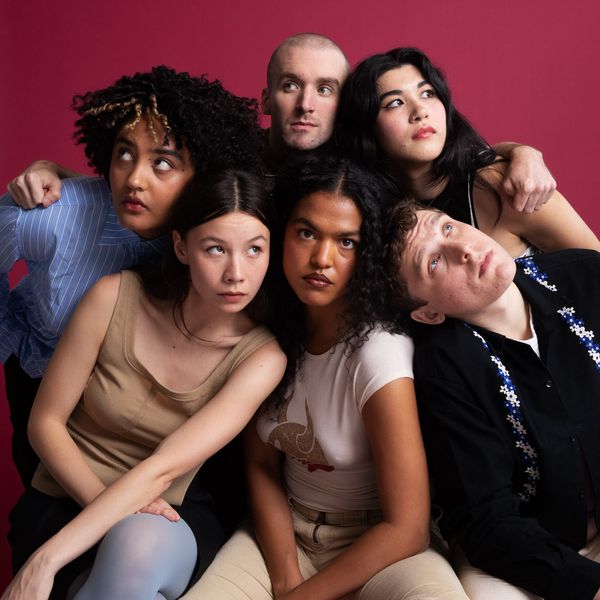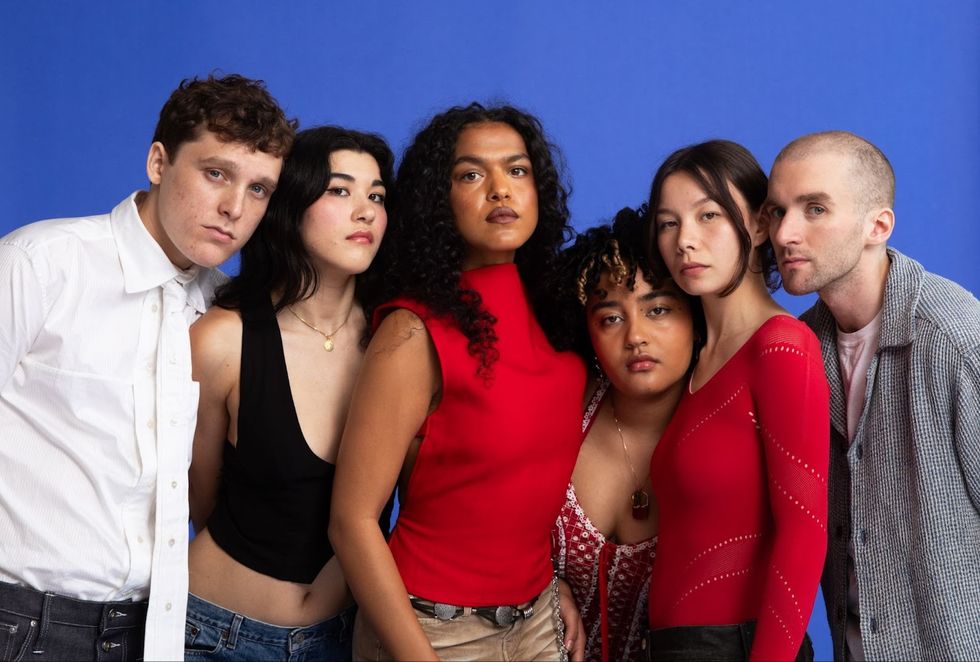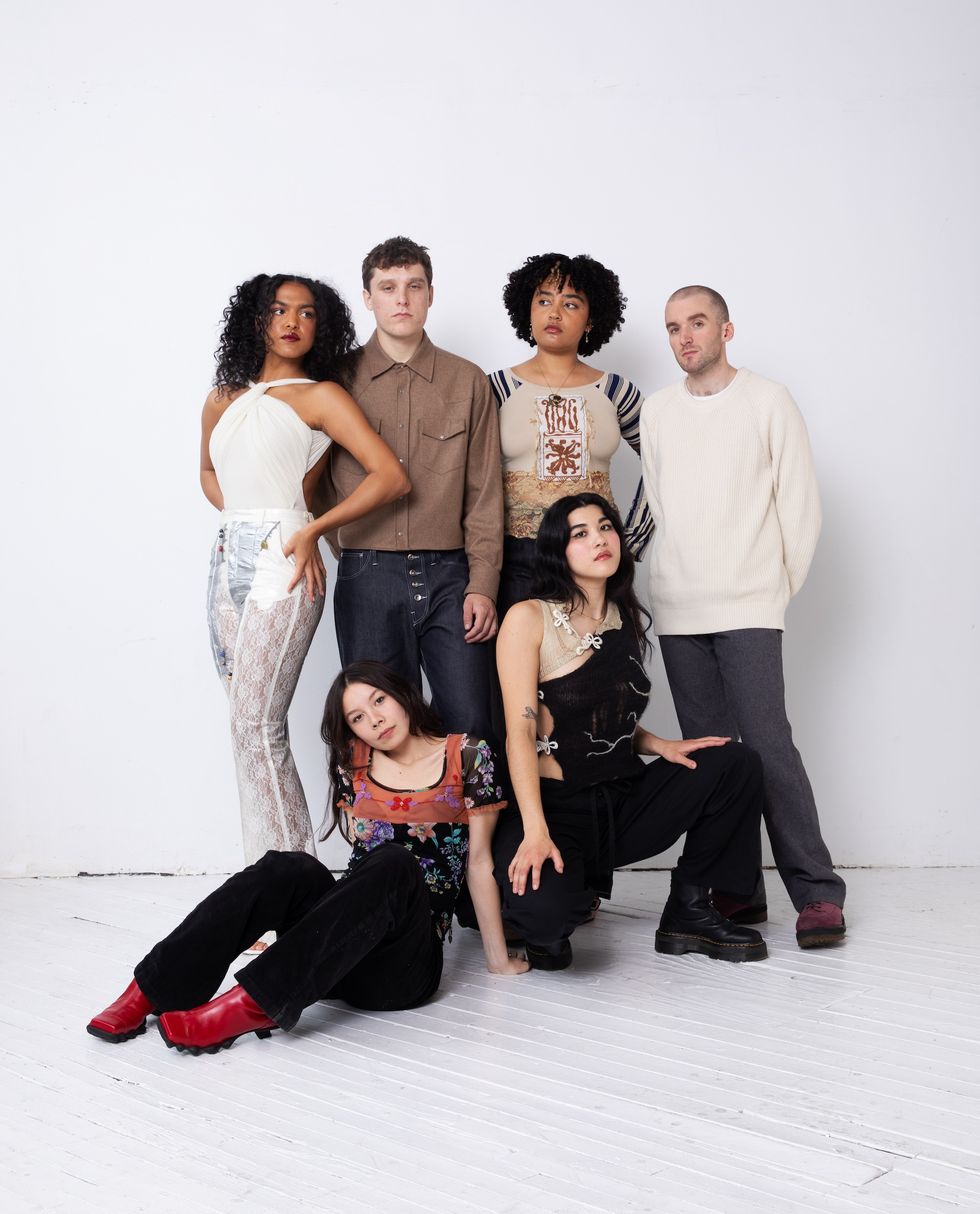
MICHELLE Grows Up
By Tobias Hess
Sep 26, 2024Let it be known: I was at the first-ever MICHELLE show.
I didn’t realize it at the time. The New York City-based music collective sounded so locked in and the crowd so enraptured that I assumed the concert was another stop on a long string of dates. It turns out, though, that this concert at the small Hudson Valley liberal arts college I attended was actually the very first time the group had all been together in the same space.
“We put out the album, got booked for that show, and it was like, Oh, we can do this all together,” Jamee Lockard tells me over Zoom, as I chat with all six members of the crew that comprises MICHELLE. “It was really bizarre to have people already singing along to the lyrics. So I think after that show, we were like, Okay, maybe this is actually a thing beyond HEATWAVE.”
That album, 2018’s HEATWAVE, was the initial passion project of Charlie Kilgore and Julian Kaufman, two young producers from New York City who both had a penchant for groove and a sonically sunny disposition. They pulled in an eclectic, yet spiritually connected line up of NYC-based vocalists and artists to create an album that captured that moment in time, working with each separately to record every song the same day they wrote them. It came together with the breezy speed of summer, windows open to alleviate NYC’s oppressive July heat.
I remember when it was released in the fall of 2018. I was a college classmate of MICHELLE members Layla Ku and Emma Lee, and at the time I was producing and making music myself. Ku and I were in the same freshman seminar and I remember her posting casually about a new album she had been a part of. It was so immediately impressive, so smartly made that I remember being filled with a strong mix of both joy and envy. I knew then that the project was more than just another classmate’s casual creative attempt.
“Once the ball started rolling, it started gathering moss along the way, and then suddenly we had a thing,” Sophia D’Angelo remembers of those early days after HEATWAVE. Some of the band members began to take meetings for the collective and in a short amount of time, they put “pen to paper,” signing to Canvasback, an imprint of Atlantic that would go on to become an imprint of Transgressive records (Arlo Parks, Alvvways, Flume). The collective was oscillating in size, but upon this legal finalé its ultimate form was reached with Kilgore, Kaufman, Ku, Lockard, Lee and D’Angelo.
Lives changed. Lockard was on track to be a doctor or a scientist, having done research work in Ecuador when MICHELLE was getting ironed out. Ku was set to be a “smart person in freshman seminar for the rest of [her] life,” laughing in reference to our scholastic connection. Lee was a prolific dancer and choreographer. Everyone was young and plans were loose and now they were here and there were still many, many questions to answer. Opportunity, circumstance and casual connection had brought the six-piece together, but now they had to rise to the occasion of forming something sturdy. Band life, after all, is equal parts business, family, collaboration and chaos. They were signing up not just to hang around the studio together and dream up new worlds, but to spend weeks in vans with one another, to toil over contracts and album art and schedules.

In many ways, it was a trial by fire. Cue AFTER DINNER WE TALK DREAMS, the band's label debut and the first record they wrote as a collective rather than as a group of disparate artists connected via Kaufman and Kilgore. That was a challenge in and of itself, but a global pandemic added another existential obstacle.
“That was a really hard record to make,” remembers Kaufman. “We had written all of these songs, and we had signed this label deal, and we had picked our singles, and we were about to go on a support tour ... and then the pandemic hit. Culture shifted about 180 degrees,” he sighs. “Everything became dance-pop and Tiktok in a matter of a month.” And their process was turned upside down as well. “[Before the pandemic], we would play entirely new songs and just see how they hit. But that didn't exist anymore.” They essentially started over.
“In a lot of ways, that record was about slamming your head against the big block of marble over and over again until you find the sculpture in it,” adds Kilgore, citing it as a “learning experience,” scars and all.
“It was also [important] in terms of us getting to know each other,” reflects D’Angelo. “Understanding the need to quarantine, we managed to do a writing trip at my family's house in Long Island, and we lived together for two weeks, writing songs every day. That got us to know each other way better than we ever did before, both as songwriters and as people.”
It was also necessary preparation for many years of touring. The last time I had seen Lee and Ku was in 2022, when they were opening for Mitski in Montreal. The thrown together family had done similarly lofty dates around the globe with the likes of Arlo Parks and Gus Dapperton, and though glamorous and exciting, the reality of tour life can be far from fun. Those times spent in creative struggle were all needed prep.
Though making an album and touring the world were difficult, the collective knew they shared the same goal: making and performing the best music possible. That said, time, experience and life itself can change how one’s definition of “best.” And on their new record, Songs About You Specifically, “best” came to be defined as something more akin to truthfulness. Whereas the first two records trafficked in hypotheticals and “dreams,” and were judged based on how well they expressed a big, clear emotions, this new record addresses the nitty gritty confusion of real life experience, hence the title and its proverbial “specifically.”

“Since our previous records are less real, there was a strong one-dimensionality to them,” shares Kaufman in a philosopher’s tone. In reference to “Hazards” off their previous record, he says, “It's a breakup song, and it's being channeled through a single emotion of ‘Fuck you, I'm angry.’ It’s so effective and emotional. But since so many of these songs are so real, there's a refusal to distill emotions into one dimension. A lot of the songs are more ambiguous, it's yes and no, it's love and hate.”
Kaufman cites that in-betweenness as a “strength and weakness” of the record, but to my ears, it's indisputably the former. Take “Mentos and Coke,” a single off Songs About You Specifically that floats in this in-between netherworld. “You and I like Mentos and Coke/ I'll be sweet while you’re stuck in my throat/ You and I a bottle rocket/ We blow up and I can’t stop it,” sings D’Angelo at the song’s onset over a bed of chopped vocal harmonies. The track, which goes on to become a gnarled, guitar-forward head-bang teeters the line between desire and exacerbation. Its chorus, the sweetly frustrated refrain, “I can’t get much bigger/ Without us falling apart/ I can't get much bigger/ Long, long fuse with a short short trigger,” feels like an anthem for the floating: when sadness leads to apathy leads to release.
That more mature emotional landscape reflects the lessons of age, but also the unique experience behind the record. It was largely written during an intense time in Ojai, California, a serene, alien-like slice of Southern California filled with orange groves and lizards. Writing it was almost akin to a camp or retreat. They hiked, hitchhiked, went to the beach, and sought out fresh orange juice. And they developed highly specific strategies for how to write together and separately.
“For two days in a row, we would split into two different groups of three, and then on the third day, we would split into three groups of two,” share’s D’Angelo. “At the end of the day, whoever finished [writing music] first would make dinner, whoever finished second would clean the dishes. And then after dinner, we would listen to the fruits of the day that we had written.” Easygoing ease mixed with rigid constraints to bring out new textures and ideas within the collective. It was also essential that the “New York City-identifying” band got out of their familiar terrain, to see what happened when brownstones gave way to the actual brown stone of SoCal’s craggy earth. It was itself a dream world, free from consequence and everyday rules, which led to some chaos. They admittedly trashed the AirBnB, creating trash piles and breaking pans in the process. With not enough beds, they traded spots on the discomforting couch, with Kilgore usually taking the L.
Maybe that gave the record its subtle edge. Kilgore and Kaufman had been working on sample-based beats for New York City rapper Deem Spencer and got in the flow of using existing textures and songs to create new worlds. You can hear it on “Oontz,” an album single that moves with the pass-it-along energy of a ‘90s girl group anthem, each singer getting 8-16 bars of succinct expression. Similarly, album standout “Cathy” moves with a doo-wop memorability, simple and true (“I wanna be with you/ You and me, Cathy”), but is is paired with the more trivial frustrations of unresolved desire (“Dry, vibrate and sigh/ Nobody wants to fuck, guess it’s me and me tonight,” goes the pent up verse).
This record is about break ups. It’s about moves. It’s about touring and traveling and being in the thrall of a crowd and then completely alone. It’s about frustration. It’s about MICHELLE. But the collective is ready to share. With a long tour planned featuring choreo meticulously composed by Lee and a renewed sense of artistic ownership, MICHELLE is moving into this next chapter with resolve.
When I ask MICHELLE what they hope is to come of this next record their answers are fittingly varied. Ku laughingly hopes they get a lucrative sync. Lee is looking forward to showing the choreography they toiled over. D’angelo and Lockard are excited to share the record in person. Kauffman tells PAPER that he hopes the record can expand their audience, to “push the boundaries of where [they’ve] been before.” But despite the variations, there's united resolve and readiness to share this record with the world. It’s a different kind of energy than HEATWAVE’s post-high school fervor, or AFTER DINNER’s trial-and-error tenacity. Maybe it’s a bit more weary. Maybe it’s a bit more grown up. Maybe we’re all just a little bit older.
Photography: Raphael Gaultier
Related Articles Around the Web
MORE ON PAPER
ATF Story
Madison Beer, Her Way
Photography by Davis Bates / Story by Alaska Riley
Photography by Davis Bates / Story by Alaska Riley
16 January
Entertainment
Cynthia Erivo in Full Bloom
Photography by David LaChapelle / Story by Joan Summers / Styling by Jason Bolden / Makeup by Joanna Simkim / Nails by Shea Osei
Photography by David LaChapelle / Story by Joan Summers / Styling by Jason Bolden / Makeup by Joanna Simkim / Nails by Shea Osei
01 December
Entertainment
Rami Malek Is Certifiably Unserious
Story by Joan Summers / Photography by Adam Powell
Story by Joan Summers / Photography by Adam Powell
14 November
Music
Janelle Monáe, HalloQueen
Story by Ivan Guzman / Photography by Pol Kurucz/ Styling by Alexandra Mandelkorn/ Hair by Nikki Nelms/ Makeup by Sasha Glasser/ Nails by Juan Alvear/ Set design by Krystall Schott
Story by Ivan Guzman / Photography by Pol Kurucz/ Styling by Alexandra Mandelkorn/ Hair by Nikki Nelms/ Makeup by Sasha Glasser/ Nails by Juan Alvear/ Set design by Krystall Schott
27 October
Music
You Don’t Move Cardi B
Story by Erica Campbell / Photography by Jora Frantzis / Styling by Kollin Carter/ Hair by Tokyo Stylez/ Makeup by Erika LaPearl/ Nails by Coca Nguyen/ Set design by Allegra Peyton
Story by Erica Campbell / Photography by Jora Frantzis / Styling by Kollin Carter/ Hair by Tokyo Stylez/ Makeup by Erika LaPearl/ Nails by Coca Nguyen/ Set design by Allegra Peyton
14 October




